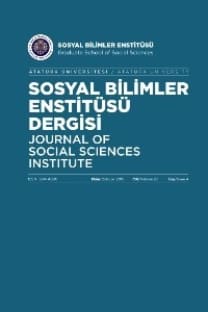İbn Sina’nın Selbî Yorumlama Metodu
Öz
İbn Sina’nın selbî yorumlama metoduna göre; Tanrı özü itibarı ile her herhangi
bir olumlu sıfatla nitelendirilmemelidir, Onun herhangi bir olumlu sıfatını anlamlandı-
rırken, olumsuz anlamlandırma (selbî yorumlama) yapılmalıdır. İbn Sina’nın bu selbî yorumlama
metodu Ortaçağ’da özellikle Yahudi filozofu Moses Maimonides (İbn Meymun)
tarafından benimsenmiştir.
Anahtar Kelimeler:
İbn Meymun, İbn Sina, Selbî Yorum
___
Altıntaş, H. (2002). İbn Sînâ Metafiziği. Ankara: Kültür Bakanlığı Yay.Angeles, P. A. (1981). A Dictionary of Philosophy. London: Harper & Row, Publishers.
Atay, H. (1974). Fârabi ve İbn Sînâ ’ya göre Yaratma. Ankara: AÜ Yay.
Bingöl, A. “İbn Sînâ’da Mantıkî Mâhiyet ve Bilinmesi”, Uluslararası İbn Türk, Hârezmi, Fârâbî, Beyrûnî ve İbn Sînâ Sempozyumu Bildirileri, (Mayıs 1990). (ss. 139–146) Anka- ra: Ankara Tarih Kurumu Basımevi.
Buijs, J. A. (1988). “The negative Theology of Maimonides and Aquinas”, The Review of
Metaphysics. Vol: XLI, Number: 4, s.727. Burrell, A. (1986). Knowing the Unknowable God: Ibn-Sina, Maimonides, Aquinas. Not- re Dame, Indiana: University of Notre Dame Press.
Cevizci, A. (1999). Ortaçağ Felsefesi Tarihi, Bursa: Asa Kitabevi.
Delhili, R. Efendi. (1972). İzharu’l-Hak. (Çev. Ömer Fehmi Efendi ve Nüzhet Efendi).
İstanbul: Sönmez Neşriyat. Drory, J. (Ed.) (1996).“The Early Decades of Ayyûbid Rule”, Perspectives on Maimoni- des: Philosophical and Historical Studies. London: Vallentine Mitchell & Co. Ltd. Press.
Ehrenkreutz, A. S. (1996). Perspectives on Maimonides: Philosophical and Historical
Studies. Kraemer Joel L. (Ed.) “Saladin’s Egypt and Maimonides”, (ss. 303–308) Lon- don: Vallentine Mitchell & Co. Ltd. Pres. Fârâbî. (trhs.). “Fusûsü’l–hikem”, Fârâbî. (Çev. H. Ziya Ülken ve Kivamettin Burslav), İstanbul: Kanaat Kitabevi. Fazlu’r-Rahman. (1990). “God and Creation: An Ecumenical Symposium.” David B. Bu- rell and Bernard, Mc Ginn (Editors), İbn Sina’s Theory of the God-World Relationship,
(ss. 50–72). Indiana: University of Notre Dame Pres. Gölcük, Ş. ve Toprak, S. (1988). Kelâm. Konya: SÜ İlh. Fak. Yay.
Hyman, A. (1996). History of İslamic Philosophy I., Seyyed Hossein Nasr and Oliver
Leamen (Editors). “Jewish Philosophy in the Islamic World”, (s.s.677-695). London and New York: Routledge. Inati, S. (1996). History of İslamic Philosophy I. Seyyed Hossein Nasr and Oliver Lea- men, Routledge (Editors). “Ibn Sînâ”, (ss. 231-243) London and New York: Routledge.
İbn Meymun. (Ed.) (1963). (Moses Maimonides). The Guide of the Perplexed I-II. Chi- cago and London: The University of Chicago Press.
________ (1975). Delâletü’l-Hâirîn. (Çev. ve tahk. Hüseyin Atay). Ankara: Ankara Ünv. İlh. Fak. Yay.
________ (1960). Makâle fi sınâ’ati’l-mantık. (Çev.ve thk. Mübahat Türker). Ankara Dil ve Tarih-Coğrafya Fakültesi Dergisi, Ankara XVIII(1–2), 9–63.
İbn Sînâ. (1992). en-Necat II, (ilahiyat bölümü) (Tah.Abdurrahman Umeyra) Beyrut: Daru’l-Cil.
________ (1960). Kitabu’ş-Şifa, (İlahiyat), C.I-II (Tah. İbrahim Medkour, G. C. Anavati, S. Zayed), Kahire.
Kuzgun, Ş. (1984). İbn Sina. Ahmet Hulusi Köker, Cihat Tunç (Ed.). “İbn Sina’nın Haya- tı ve Milliyeti”, Kayseri: Erciyes Üniversitesi Matbaası. ss.3–25.
Küken, G. (1996). İbn Rüşd ve St. Thomas Aquinas Felsefelerinin Karşılaştırılması. İs- tanbul: Alfa Basım Yayım Dağıtım.
Leaman, O. (1990). Moses Maimonides. London: Routledge.
________ (1992). Ortaçağ İslâm Felsefesine Giriş. (Çev. Turan Koç). Kayseri: Rey Ya- yıncılık.
Leibowitz, Y. (1989). The Faith of Maimonides. (English translation by John Glucker)
Israel: Naidat Press Ltd. Levinger, J. (1990). Studies in Maimonides. Isadore Twersky (Ed.). “Was Maimonides
“Raıs Al – Yahud” in Egypt”, (ss. 83-92) London: Harvard University Pres. Novak, D., (1999). “The Mind of Maimonides, “First Things 90: The Journal of Religion and Public Life, 27–33.
Pines, S. (1963). “The Guide of the Perplexed: With an İntroductory Essay.” The Phi- losophıc Sources of The Guide of Perplexed, Chicago and London: the University of Chicago Press.
Ravıtzky, A. (1990). “Studies in Maimonides.” Isadore Twersky (Ed.) The Secrets of the Guide to the Perplexed: Between the Thirteenth and the Twentieth Centuries”, (ss.159– ). London: Harvard University Press.
Ross, D. (2002). Aristoteles, (Çev. Ahmet Arslan, İhsan Oktay Anar, Özcan (Yalçın) Ka- vasoğlu, Zerrin Kurtoğlu). İstanbul: Kabalcı Yayınevi.
Sarıoğlu, H. (1993). İbn Rüşd ve Felsefesi. (Yayımlanmamış Doktora Tezi), İstanbul, Türkiye.
Schumacher, E. F. (1990). Aklı Karışıklar İçin Klavuz. (Çev. Mustafa Özel). İstanbul: İz Yayıncılık.
Stern, J. (2000). “Maimonides and the Sciences.” Robert S. Cohen and Hilel Levine (Ed.).
Maimonides on Language and the Sciences of Language, (ss.170–184). Boston, London: Kluwer Academic Publishers. Strauss, L. (1963). The Guide of the Perplexed: With an İntroductory: Essay. “How to
Begin to Study the Guide of the Perplexed”, Chicago and London: the University of Chicago Press. Şeşen, R. (1987). Salâhaddîn Eyyûbî ve Devlet. İstanbul: Çağ Yay.
Tunç, Cihat. (1984). “İbn Sînâ’da Zorunlu Varlık”, İbn Sînâ Kongresi Tebliğleri, Kayseri: EÜ Matbaası.
Türker, M. (1956). Üç Tehâfüt Bakımından Felsefe ve Din Münasebeti. Ankara: T.T.K. Basımevi.
Türker, M. (1960). “İbn Meymun, Makâle fi sınâ’ati’l-mantık”. (Çev. ve tahk. Mübahat Tür- ker), “Giriş”, Ankara Dil ve Tarih-Coğrafya Fakültesi Dergisi, Cilt: XVIII, (1–2), 20–21.
Ülken, H. Z. (1946). İslâm Düşüncesi. İstanbul: İÜ Edebiyat Fak. Yay.
Weber, A. (1993). Felsefe Tarihi. (Çev. H.Vehbi Eralp). İstanbul: Sosyal Yay.
Wolfson, H. A. (2001). Kelâm Felsefeleri. (Çev. Kasım Turhan). İstanbul: Kitabevi Ya- yıncılık.
- ISSN: 1304-4990
- Yayın Aralığı: Yılda 4 Sayı
- Yayıncı: Atatürk Üniversitesi Sosyal Bilimler Enstitüsü Müdürlüğü
Sayıdaki Diğer Makaleler
Turkish textbooks dialogues and comparable authentic conversations
İkinci Meşrutiyet Devrinde Meclis-i Mebucan’ca Düşürülen İlk Kabine: Kâmil Paşa Hükümeti
Ders Kitabı Diyalogları ve Karşılaştırılabilir Orijinal Diyaloglar
Karacasu'da turizm girişimciliği araştırması
Kars Şüregel’de Yerleşen Topluluklar
Ufuk ŞİMŞEK, Kemal DOYMUŞ, Ataman KARAÇÖP
Türkiye'de kamu harcamaları ve büyüme ilişkisi: Sınır testi yaklaşımı
Selim BAŞAR, Özgür POLAT, M. Sinan TEMURLENK, Hayati AKSU
Kars Şüregel'de yerleşen topluluklar
Türk Dil Kurumunun İmlâ/Yazım Kılavuzlarındaki Değişikliler Üzerine Bir İnceleme
